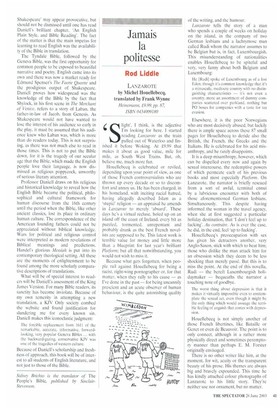Jamais la politesse
Rod Liddle
LANZAROTE by Michel Houellebecq, translated by Frank Wynne Heinemann, £9.99, pp. 87, ISBN 0434009180
S
‘ light': I think, is the adjective I'm looking for here, I started ,.
pulled out of Waterloo and finished it before Woking. At £9.99 that makes it about as good value, mile for mile, as South West Trains. But, oh, believe me, much more fun.
Houellebecq is celebrated or reviled, depending upon your point of view, as one of those French controversialists who are thrown up every decade or so to discomfort and annoy us. He has been charged, in his homeland. with inciting racial hatred, having allegedly described Islam as a 'stupid' religion — an appraisal he amends in Lanzarote to merely 'absurd', These days he's a virtual recluse, holed up on an island off the coast of Ireland, every bit as puzzled, tormented, unrepentant and probably drunk as the best French novelists are supposed to be. This latest work is terrible value for money and little more than a blueprint for last year's brilliant Platform; but all that notwithstanding, you would not wish to miss it.
Because what gets forgotten, when people rail against Houellebecq for being a racist, right-wing pornographer or, for that matter, when they rally to his cause — as I've done in the past — for being uncannily prescient and an acute observer of human behaviour, is the quite astonishing quality of the writing, and the humour.
Lanzarote tells the story of a man who spends a couple of weeks on holiday on the island, in the company of two German lesbians and a lachrymose man called Rudi whom the narrator assumes to be Belgian but is, in fact, Luxembourgish. This misunderstanding of nationalities enables Houellebecq to be spiteful and very, very funny about both Belgium and Luxembourg:
He [Rudi] spoke of Luxembourg as of a lost Eden. though it's common knowledge that it's a minuscule, mediocre country with no distinguishing characteristics — it's not even a country, more an assortment of dummy companies scattered over parkland, nothing but PO boxes for companies with a taste for tax evasion.
Elsewhere, it is the poor Norwegians who are most decisively abused, but luckily there is ample space across these 87 small pages for Houellebecq to deride also the British, the French, the Greeks and the Italians. He is celebrated for his acid misanthropy, and he rarely disappoints.
It is a deep misanthropy, however, which can be dispelled every now and again by sexual intercourse, the redemptive powers of which permeate each of his previous books and most especially Platform. On Lanzarote, the narrator is briefly rescued from a sort of awful, terminal ennui by a lubricious encounter with both of those aforementioned German lesbians, Simultaneously. This despite having informed the woman in the travel agency, when she at first suggested a particular holiday destination, that 'I don't feel up to fucking'. Au contraire. As is ever the case, he did, in the end, feel 'up to fucking'.
Houellebecq's preoccupation with sex has given his detractors another, very Anglo-Saxon, stick with which to beat him; those who dislike the man attack him for an obsession which they deem to be less shocking than merely passé. But this is to miss the point. At the end of this novella, Rudi — the bereft Luxembourgish holidaymaker — bequeaths the narrator a touching note of goodbye.
The worst thing about depression is that it makes it virtually impossible even to contemplate the sexual act, even though it might be the only thing which would assuage the terrible feeling of anguish that comes with depression.
Houellebecq is not simply another of those French libertines, like Bataille or Genet or even de Beauvoir. The point is to only connect, although in a rather more physically direct and sometimes peremptory manner than perhaps E. M. Forster originally envisaged.
There is no other writer like him, at the moment, for wit, acuity or the transparent beauty of his prose. His themes are always big and bravely expounded. This time he has kindly attached colour photographs of Lanzarote to his little story. They're neither use nor ornament, but no matter.


































































 Previous page
Previous page